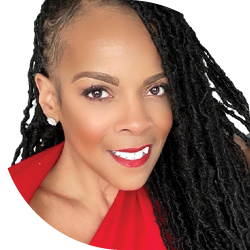APA.org.......APA Style.......APA Services.......Divisions

Wizdom Powell, PhD
Chief Purpose Officer,
Headspace
Dr. Powell is a tenured professor, nationally recognized expert and thought leader on racial trauma, healing, and health equity. Currently, she also serves as Chief Purpose Officer at Headspace. She serves as an equity brand strategist for corporations, non-profits, and academic institutions. She is also a routine media contributor to ABC News Live and was recently named one of the top 25 essential voices on Black mental health. She is a highly-sought speaker who has given invited testimony to the President’s Cancer Panel and House Committee on Ways and Means. Her numerous scientific articles have been published in the American Journal of Public Health, Journal of Internal Medicine, Behavioral Medicine, and Child Development. Her scientific research has been covered by CNN, Business Insider, The Root, Refinery29, The Washington Post, Huffington Post, The Grio, Ebony Magazine, Vice, Tonic, NPR, Vox, Futurity, Forbes, Christianity Today, and Vibe Magazine. In recognition of her public service to boys and men, Dr. Powell received the American Psychological Association’s (d51) Distinguished Professional Award. She is also a White House Fellow, Ford Foundation Fellow, Robert Wood Johnson Foundation Fellow, Aspen Institute Health Innovator Fellow, and awardee of the prestigious Rockefeller Foundation academic writing residency in Bellagio, Italy.
Disrupting single stories: The whole truths about Black male masculinities and mental health
Saturday, August 10
3:00-3:50 p.m. PDT
Seattle Convention Center, Arch Building,
Ballroom 6BC
The single stories we tell in science, public policy, and clinical practice about masculinities position Black men and boys merely as problems to be solved. As a consequence, the field of psychology is overwhelmed by deficits-focused science and strategies. What if we focused on speaking to the wounds and wonder of Black males? This session aims to elevate what we gain as a society when we recognize the humanity of underserved men and boys. It also offers insights about assets-based storytelling strategies we need to advance Black male mental health equity.
American Psychological Association
750 First St. NE, Washington, DC 20002

